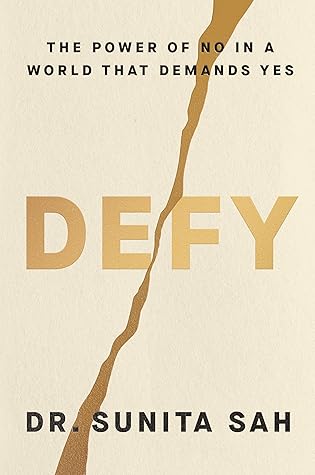More on this book
Kindle Notes & Highlights
When you think of the long and gloomy history of man, you will find more hideous crimes have been committed in the name of obedience than have ever been committed in the name of rebellion.
My research has shown me, again and again, that what someone believes their values to be is quite different from how they actually behave. In experiment after experiment, I’ve learned that for many of us, the distance between who we think we are and what we actually do is enormous.
And my research shows that it is in fact incredibly difficult for most people to defy an order, even an unspoken one—from an authority, a peer, or even a stranger. Despite our ideals and best intentions, we most often choose obedience over disobedience, submission over disruption, compliance over defiance.
A society without any compliance is anarchy; a society with total compliance is fascism.
Defiance isn’t about emulating anyone else. It’s about acting in alignment with your own values.
But Milgram was not only surprised by his results, he was repulsed. Soon after the experiment, he wrote in a letter to the National Science Foundation: In a naïve moment some time ago, I once wondered whether in all of the United States a vicious government could find enough moral imbeciles to meet the personnel requirements of a national system of death camps, of the sort that were maintained in Germany. I am now beginning to think that the full complement could be recruited in New Haven.
It is difficult to dehumanize or ignore the harm someone is inflicting on another person when one is face-to-face with them.
“If one had as one’s ultimate authority God,” the professor said in an interview after the study was completed, “then it trivializes human authority.”
Moral convictions can be so deeply felt that they enable us to oppose authority, ignore pressures to comply, and even break the law. When we feel that something is morally wrong, we are less susceptible to external influence, and more willing to take a stand for our beliefs. Such convictions can give us strength and the motivation to defy. But unexamined, such convictions can be dangerous. If the only belief that matters to us is our own subjective sense of what is right and wrong, we lose tolerance for different opinions, and our convictions can drive us to commit acts that instigate
...more
Values such as integrity, compassion, or humanity cannot be classified as facts. Moral convictions, on the other hand, are experienced in the same way as a fact—an objective, irrefutable truth. The problem is, strongly held moral convictions usually have two possibilities about what is right or wrong. They are subjective.
“It’s not who you want to be,” I thought, “but if it’s happening again and again, perhaps it is who you are.” Actions speak louder than words, especially when those actions repeat.
We are what we do, regardless of how we see ourselves—and what we do, over time, affects our self-perception. Not to mention the way others perceive us.
People who defy learn how to listen to their inner voice, so that they can behave in ways that are true to themselves—to cut through their self-deceptions and rationalizations, their entrenched ideas about obedience, and act in accordance with their values. They don’t always do this overnight. Like the pursuit between our independent and interdependent ideal selves, living in total harmony with our values is also an ideal.
Some people defy despite great risks to their physical and psychological safety. Often, they defy even when they are certain it will not lead to lasting change. But a clear understanding of the possible risks, costs, and benefits allows us to make an informed decision. The choice is ours.
Defiance can be a world-changing decision. When we take our responsibility for others seriously and enact a True No, we have the power to remake corrupt institutions, reform oppressive environments, and even topple authoritarian regimes. The onus for societal change, however, should not lie at the doorstep of individuals who are at the receiving end of oppression or discrimination. Those within institutions, especially those with power, have greater responsibility to act in ways that preserve a person’s right to a True Yes and a True No.


